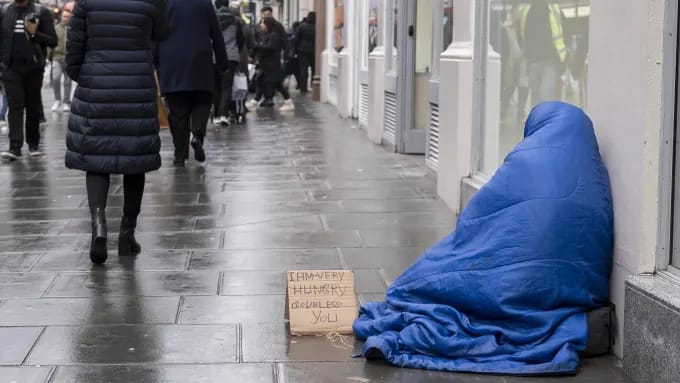
Britain Grapples with Dire Poverty and Victorian-Era Inequality
A recent report from the Centre for Social Justice paints a grim picture of economic disparity in the United Kingdom, revealing that the most disadvantaged people have seen no improvement in their circumstances over the past 15 years. The independent think tank, previously instrumental in welfare system reform, warns of a “yawning gap” between those barely getting by and those trapped at the bottom.
Released on Sunday, the 300-page report highlights the challenges posed by the UK’s economic stagnation, making poverty harder to tackle amidst a cost-of-living crisis. Sophia Worringer, Deputy Policy Director at the Centre for Social Justice, underscores the dichotomy: “The general public can get by, but there is this cohort facing family breakdowns, physical and mental health issues, crime-ridden communities, and multiple barriers to work.”
The report issues a stark warning that the UK risks regressing into a Victorian-era scenario with a widening gulf between mainstream society and a poverty-stricken underclass reminiscent of the 19th century. It emphasizes that poverty is becoming “entrenched,” citing family breakdown, addiction, joblessness, personal debt, and educational failure as drivers of disadvantage.
Drawing from a survey of 6,000 people, including over half from impoverished communities, and insights from 350 charities and experts across 20 towns and cities, the report declares, “For too many, Britain is broken, and the gap between the haves and have-nots is in danger of becoming a chasm,” as articulated in the foreword signed by former Bank of England governor Mervyn King and others.
The study points out that average weekly wages in Britain have stagnated since the 2008 financial crisis when adjusted for inflation, leaving 38% of Universal Credit claimants still in work but struggling to make ends meet. Insecure and poor-quality work further complicates the situation, making the leap into employment unappealing for some.
The report also blames pandemic lockdowns for exacerbating poverty drivers, with a catastrophic effect on the nation’s social fabric. Domestic abuse helpline calls surged 700%, mental health problems in young people increased, severe school absences rose, and 1.2 million more people received welfare payments. Deaths from alcohol poisoning, previously declining, rose during the Covid-19 outbreak.
Worringer notes the lasting impact on those left behind, stating, “Life for them never returned to normal, and the scars of that time are still deeply felt.” If current trends persist, over a quarter of children aged five to 15 could have mental health disorders by 2030. The report promises an ambitious set of policy recommendations next spring to address the root causes of poverty, emphasizing the urgent need for intervention to secure a better future for the nation.
In a separate report by the Resolution Foundation, income inequality in Britain is revealed to be higher than in any other large European country. The toxic combination of slow growth and high inequality has strained the living standards of low- and middle-income individuals well before the onset of the cost-of-living crisis. Inflation-adjusted wages have flatlined since 2007, resulting in an average worker losing £10,700 ($13,500) per year in pay growth.
Credit CNN
